|
|
|
Sort Order |
|
|
|
Items / Page
|
|
|
|
|
|
|
| Srl | Item |
| 1 |
ID:
183753
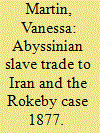

|
|
|
|
|
| Summary/Abstract |
In March 1877, the British searched a ship named The Rokeby and discovered eight Abyssinian child slaves on board. It is argued that, hitherto frustrated by the constant evasion of their attempts to supress the slave trade, they used the event to bring pressure on local government officials and merchants of Bushehr to cease their collusion and involvement. The result was a decline in the trade at least in the coast around Bushehr. There having been hitherto no specific studies of the Abyssinian slave trade to Iran, the case has also been taken as an opportunity to discuss it from its country of origin through Mecca and Jeddah, then in Ottoman territory, and to the Gulf ports of Iran, which allows an indicative comparison of Ottoman and Iranian policies of suppression. Rare insight has been provided into the experiences of the slaves themselves by the first-hand accounts of their journeys from Abyssinia given to the British.
|
|
|
|
|
|
|
|
|
|
|
|
|
|
|
|
| 2 |
ID:
183741


|
|
|
|
|
| Summary/Abstract |
Greece and Russia had had a long and complicated relationship to the Ottoman Empire and especially to its sizable Orthodox Christian minority. The Sick Man of Europe was trying to cure himself quite vigorously from 1856 to 1908 but most contemporary Western and Balkan observers as well as modern historians did not rate Ottoman modernization efforts very high. Unlike their Russian counterparts implemented in the same time period, they are never labeled as ‘Great Reforms’. This article will demonstrate that during Tanzimat and its sequels, even Turkey’s archrival yet similarly dynastic empire supported Ottoman secularization and religious equality short of removing residual Christian Orthodox autonomy. Surprisingly, a very different polity, the ethnocentric Greek nation-state had similar reactions hoping to enable Ottoman Greeks to dominate the Sultan’s realm politically and economically. Russia’s motive was also to extend its influence through the traditional Ottoman institution - the Patriarchate of Constantinople - without destroying the Ottoman Empire or even engaging in conspicuous unilateralism and thereby provoking another war with the other Great Powers. While St Petersburg attempted to steer Ottoman reforms along federative lines advocating broad autonomy for Christian majority provinces, Athens backed Sultan’s direct rule except in ethnically Greek areas like Crete.
|
|
|
|
|
|
|
|
|
|
|
|
|
|
|
|
| 3 |
ID:
183751
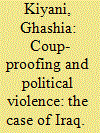

|
|
|
|
|
| Summary/Abstract |
This article examines the impact of coup-proofing on political violence while a leader is in power and during regime transition. This study focuses on the case of Iraq during Saddam Hussein’s rule between 1979-2003 and including the aftermath of the 2003 US invasion, which led to Saddam’s removal from power. The article argues that Saddam Hussein’s coup-proofing strategies allowed him to implement political violence and human rights abuses against the wider population. Moreover, Saddam’s coup-proofing strategies exacerbated violence beyond his rule by driving his former regime loyalists into violent insurgencies as well as indirectly by setting up a society with large amounts of distrust between loyalists and others.
|
|
|
|
|
|
|
|
|
|
|
|
|
|
|
|
| 4 |
ID:
183754


|
|
|
|
|
| Summary/Abstract |
The revolutionary 1960s are often seen as the heyday of socialist theories and leftist movements. In the Middle East the period until the Arab-Israeli war of 1967 is regularly perceived as the pinnacle of secular, socialist Arab nationalism in the region, whereas the rise of various forms of political Islam is often presented as a phenomenon pertaining to a different era beginning in 1979. This article proposes a perspective which situates important Islamic thinkers in the intellectual environment of the revolutionary 1960s. Starting with the Algerian war in 1954 and lasting until the Iranian revolution of 1979, I argue that the ‘long’ 1960s were dominated not only by Marxist thinkers like Frantz Fanon and Jean-Paul Sartre. Muslim revolutionary intellectuals, such as Malek Bennabi, Amar Ouzegane, or ʿAli Shariʿati, also took part during the Algerian war in the shaping of a new discourse in France.
|
|
|
|
|
|
|
|
|
|
|
|
|
|
|
|
| 5 |
ID:
183748


|
|
|
|
|
| Summary/Abstract |
The Zionist-Israeli Right and the Kibbutz Movement have shared a longstanding and powerful historical rivalry, but their interrelationships were more complex than presented in historiography and recollected in public consciousness. This article seeks to systematically lay out, for the first time, the interfaces between Menachem Begin, the parties under his leadership and the kibbutzim. The discussion will focus on two periods: the first, which has received almost no attention in historiography – the late 1960s and early 1970s – a phase characterized by rapprochement and reconciliation between the leader of the Israeli right-wing party and the Kibbutz Movement. The second, the stage following the political ‘upheaval’ (1977) is better-known but has not yet been thoroughly researched. This period is characterized by an escalation in the relationship between the Likud, Prime Minister Menachem Begin and the Kibbutz Movement. The article examines the contribution of both sides to this escalation, as well as the various economic, social, and political contexts within which it was manifested and its place in Israel’s political history at large.
|
|
|
|
|
|
|
|
|
|
|
|
|
|
|
|
| 6 |
ID:
183742
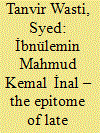

|
|
|
|
|
| Summary/Abstract |
İbnülemin Mahmud Kemal İnal was born in Istanbul as the son of a Pasha and, spending his entire working life as a bureaucrat, reached the highest levels in the Ottoman Civil Service. His career spanned the last years of the Ottoman Empire as well as the first decades of the Turkish Republic. As a result, he became uniquely qualified to write about people and events he had witnessed. He had a remarkably keen memory, and a high level of accomplishment in Arabic, Persian and French. With deep interests in literature, history, calligraphy, art and Turkish classical music, he almost became a one-man cultural institution. As a lifelong bachelor, he spent much time and effort in order to produce several encyclopaedic works on late Ottoman history, literature, music and culture.
|
|
|
|
|
|
|
|
|
|
|
|
|
|
|
|
| 7 |
ID:
183746


|
|
|
|
|
| Summary/Abstract |
This article examines developments within the Jewish community in Turkey during and after the Israeli operation in Gaza in 2014 and describes the political relations between Israel and Turkey and its impact on local Turkish Jews. It depicts Operation Protective Edge as one of the peaks of antisemitism in Turkey and considers the question of whether antisemitism in Turkey is related to Turkish-Israeli relations. This study contributes to the scholarship on the perception of Jews in Turkey in light of Turkish-Israeli relations. The paper begins by introducing minority discourse, and then describes the historical background of Turkish-Israeli relations, the perception of Jews, and the effects of the Protective Edge on the Jewish community in particular and on Israeli-Turkish relations in general during that period. Subsequently, the main findings are presented.
|
|
|
|
|
|
|
|
|
|
|
|
|
|
|
|
| 8 |
ID:
183747


|
|
|
|
|
| Summary/Abstract |
This article will address Israel’s ambiguous policy regarding Jerusalem in the context of the activity of the foreign consulates in the city as it emerges from the Israeli documents in the 1950s. Divided Jerusalem in the 1950s was the focus of widespread international activity. This situation was created in the wake of UN Resolution 181 and the inability of the international community to implement the resolution. That the city was divided between two countries engaged in a violent confrontation enabled international parties to exploit the situation for their own interests in the inter-block conflict. The consular activities of the Americans and the French in Jerusalem will be investigated in the context of Israeli policy and the Cold War. The case of the Czechoslovakian consul illustrates this reality.
|
|
|
|
|
|
|
|
|
|
|
|
|
|
|
|
| 9 |
ID:
183743


|
|
|
|
|
| Summary/Abstract |
The article is a study of the reception of antisemitism, and its appeal among Turkish nationalists and state elites in the 1930s and 1940s. Based on a closed reading of the investigation of İnkılâp, the first antisemitic journal published in Turkey, by state bureaucrats in 1933, the article argues that antisemitism in the 1930s offered Turkish nationalist actors of competing convictions a tool to legitimize contending versions of Turkish nationalism, as well as a novel language to legitimize already existing antiminority practices explicitly against local Jews. Nationalist actors could thus discriminate against Turkish Jews without reference to religious difference. Finally, this study has detected an increased input of European post-First World War European antisemitism, especially the German post-Versailles conspiratorial ‘stab-in-the-back’ antisemitic theme and argues that this association had been facilitated by the increased relations between the Ottoman Empire/Turkey and Germany since the late nineteenth century.
|
|
|
|
|
|
|
|
|
|
|
|
|
|
|
|
| 10 |
ID:
183750
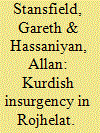

|
|
|
|
|
| Summary/Abstract |
This article sheds light on recent political developments in Rojhelat (Eastern/Iranian Kurdistan), focusing on the activities of Rojhelat’s leading political parties. This study argues that the existing situation in the area is a product mainly of the shift in Rojhelat’s mainstream political organisation, the Kurdistan Democratic Party of Iran, in its political and military approach to the Kurdish movement in Iran, popularly known as Rasan-i Rojhelat (the revival/sudden rise of Eastern Kurdistan). This has triggered a new, high level of conflict between Kurds and the Islamic Republic of Iran since 2015. Since the announcement of the Rasan, tit-for-tat clashes between Kurdish Peshmerga/guerrilla units and the Islamic Revolutionary Guards Corps (IRGC) have been witnessed across Rojhelat. Analysis of the Kurdish question in Rojhelat reveals this development as multifaceted and complex, involving multiple actors and activities such as insurgency and collective protest from Kurdish civil society. This article focuses on two main developments: the methods and practices deployed by the Kurdish political parties of Rojhelat following the Rasan, and the sudden announcement of negotiations between representatives of the Iranian government and of four of Rojhelat’s political parties from 27-28 July 2019 in Oslo.
|
|
|
|
|
|
|
|
|
|
|
|
|
|
|
|
| 11 |
ID:
183752


|
|
|
|
|
| Summary/Abstract |
In the 2000s CE, Saudi Arabia saw the emergence of the civil rights group HASM (or ACPRA), whose members engaged in civil society activism for basic rights and argued that their activism could be described as peaceful, civil jihad. In their books, declarations and lectures, HASM’s members presented a complex Islamic theory of civil society activism and explained why they considered what they were doing legitimate. Their theory above all rested on the idea that civil society activism was a form of jihad and superior of other forms, like military jihad. This paper focusses on HASM’s concept of peaceful, civil jihad. It is a complex concept, which is based on the ideas of some twentieth and twenty-first century Islamic scholars, but nevertheless constitutes a new interpretation of the term jihad. HASM’s idea that civil society activism is peaceful, civil jihad is not only relevant in the Saudi context. Rather, it is a significant contribution to the ongoing debate about the meaning of jihad in modern Muslim societies.
|
|
|
|
|
|
|
|
|
|
|
|
|
|
|
|
| 12 |
ID:
183744
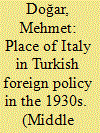

|
|
|
|
|
| Summary/Abstract |
For many scholars working on Turkish foreign policy in the 1930s, Italy is taken as the greatest threat to the newly-established Republic and one that dominated Turkish foreign policy making in this period. Italy did adopt a threating stance with the Italian occupation of the Dodecanese islands and its expansionist aims in Asia and Africa, which were a cause of concern for the Turkish government. A re-examination of the Turkish-Italian political and economic relations within the broader context of the Mediterranean and the great power politics of the period, however, demonstrates that the bilateral relations, at least officially, functioned without any significant and lasting crisis until the Italian invasion of Albania in 1939. What motivated and drove Turkish thinking and decision-making in the international arena was not Italy’s actions per se but the insecurity in the Mediterranean and beyond of which Italy was a part.
|
|
|
|
|
|
|
|
|
|
|
|
|
|
|
|
| 13 |
ID:
183755
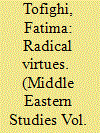

|
|
|
|
|
| Summary/Abstract |
Disillusioned by possibilities of political reform in an economically developing country, the Irani-an radicals of the 1960s and 70s adopted certain practices. These bodily techniques served both practical concerns and radical self-fashionings. That is, the guerrilla fighters had to familiarize themselves with mountains and forests, recruit members from the working class, and subsist on minimal means in communal houses. But they also would not succumb to the newly-emerging comprador bourgeois values that was, in their opinion, feeding imperialism. In this article I study those bodily practices in their global context, by reference to the practical and theoretical back-ground. It is interesting that while the paramilitary or theoretical aspects of these movements were not always appealing to the larger society, the bodily ethics could intrigue people from across the political or religious spectrum. The particular virtues of self-sacrifice, resilience, self-reliance, seriousness, among other things were cultivated by means of bodily practices. By these kinds of bodily resistance, Iranian radicals formed a subjectivity outside the dominant/dominated binary, where increasing political consciousness involved lifestyle changes on the most private surface.
|
|
|
|
|
|
|
|
|
|
|
|
|
|
|
|
| 14 |
ID:
183749


|
|
|
|
|
| Summary/Abstract |
During 1950-1951 approximately 125,000 Jews immigrated to Israel from Iraq, where they had constituted 95% of the Jewish community. The vast number of migrants surprised the governments of Iraq, Israel, and Britain and the Iraqi Jews themselves because this had been an ancient, established, wealthy community, well integrated socially, economically, and culturally into Iraq, its perceived homeland. Moreover, the migrants’ destination, the impoverished young State of Israel, lacked appeal. One explanation for this phenomenon links it with a series of terrorist acts that occurred in Baghdad during 1951-1950, portraying them as an Israeli provocation that sparked panic and mass emigration. Although historical studies based on archival documents from the time refute this claim, it still has supporters among Arab countries, Jews of Iraqi background in Israel and elsewhere, and academics. This article juxtaposes the terrorism narrative with the findings of historical scholarship on the mass migration of Iraqi Jews, in an effort to explain the endurance and lasting influence of this narrative.
|
|
|
|
|
|
|
|
|
|
|
|
|
|
|
|
| 15 |
ID:
183745


|
|
|
|
|
| Summary/Abstract |
This article reconsiders the 1960 coup in Turkey, paying particular attention to the interactions and power relations in play, both within the army and between the army and civilians. I argue that the 1960 coup, rather than being an example of the military resolving a political crisis, is better understood as the army exploiting a social context which lent itself to portraying the use of force against the government and its allies as legitimate. First, I show that the 27 May coup consisted in dissident officers exploiting a context to push through sector-specific demands. Second, I depict the instability constituting the period of military administration and the following months. This enables me to show how the general staff, drawing on the support of civilian political actors, managed to re-establish the army’s hierarchy and stabilize its internal power relations. Finally, I analyze how the military institution managed to impose its authority over civilians during the years following the 1960 intervention, thanks to the judicial, economic, and institutional autonomy it acquired as of this first coup
|
|
|
|
|
|
|
|
|
|
|
|
|
|
|
|
|
|
|
|
|